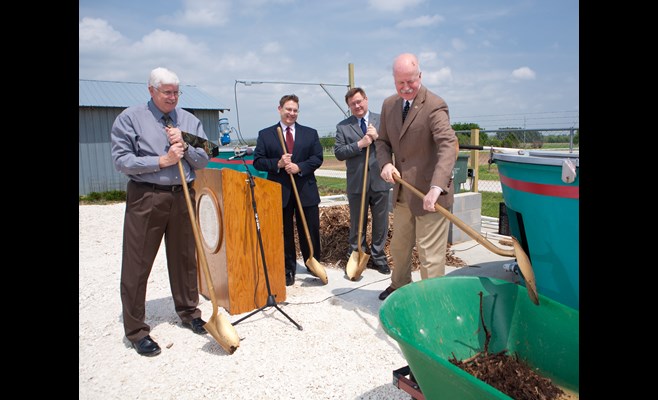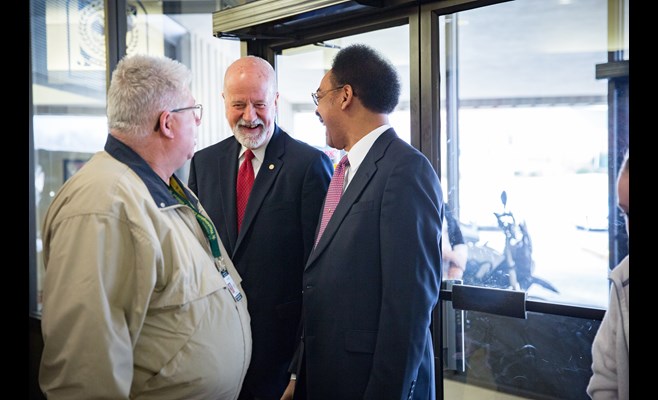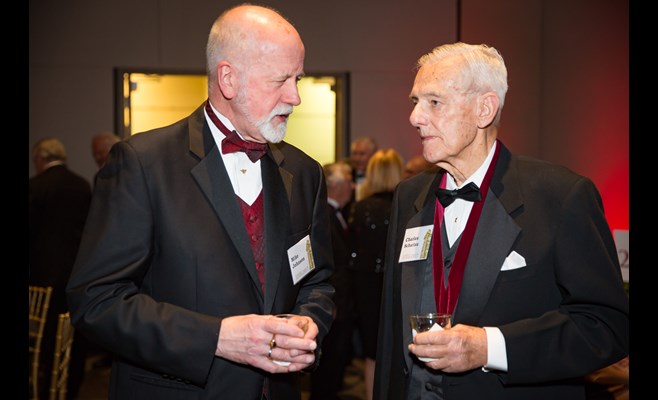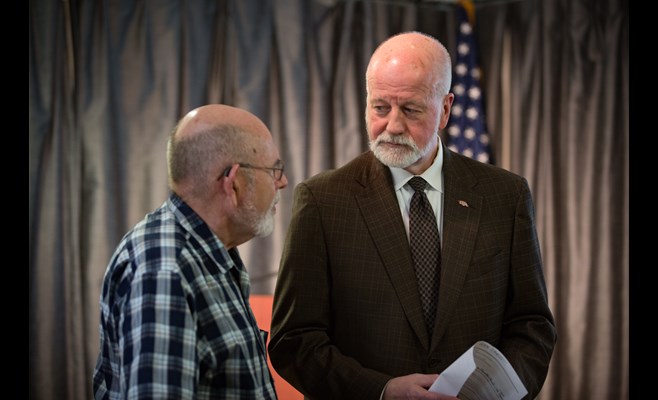FAYETTEVILLE, Ark. – Mike Johnson, associate vice chancellor for facilities, will retire from his position after serving 17 years at the University of Arkansas.
Johnson is responsible for supervising the largest and longest construction campaign in the University’s history totaling more than $1.9 billion in value.
He will retire March 15, 2021, 17 years to the day he started.
Scott Turley, who has been with the U of A since 1993, will serve as the interim associate vice chancellor for facilities. Turley has been involved in many campus projects over the years, serving in numerous leadership roles with FAMA.
Since joining the university in 2004, Johnson has directed a number of the largest projects in the campus’s history that has included residence halls, libraries, research centers and major athletics facilties.
Most recently, Johnson oversaw the completion of Adohi Hall, the newest residence hall on campus. It was the only residence hall project in the United States to use cross-laminated timber and the first multi-story advanced timber structure in Arkansas.
Some other projects that are still in construction but have been a major part of Johnson’s planning and oversight include the new on-campus Student Success Center, the Windgate Art and Design District and the Civil Engineering Research and Education Center.
“Mike Johnson – or The Admiral, as he is respectfully referred to on campus – has been the steady hand building our campus during an unprecedented time of growth, leading the delivery of millions of dollars worth of construction projects and capital improvements, energy savings efforts, an augmentation of our campus recycling program, a campus beautification effort and the preservation of our beloved Senior Walk,” said Chancellor Joe Steinmetz. “He has been a stalwart leader on campus and in our community, having dutifully represented the U of A on numerous boards and commissions throughout our region. We wish Mike well in his much-deserved retirement.”
Johnson served on many key committees including the Chancellor’s Administrative Policy Council, the Public Art Advisory Committee, the Design Review Board, the Building & Facilities Committee, the Landscape & Grounds Committee and was co-chair of the Arkansas Alumni Association’s Red, White & True Campaign (2013) and the United Way Campaign (2005 & 2006). He’s currently been serving on the U of A’s Sustainability Council since 2008.
Johnson has also been an active contributor to the Northwest Arkansas community including serving on the Northwest Arkansas Regional Airport's Authority Board since 2008, when he was appointed by the City of Fayetteville. He served as chair from 2016-2018 and was recently reappointed to a third, six-year term.
In 2005, Johnson was awarded the Outstanding Lifetime Achievement in Public Works award by the American Society of Civil Engineers and was also named to the National Academy of Construction and the Arkansas Academy of Civil Engineering.
In February 2010, Johnson was elected to the National Academy of Engineering, one of the highest professional honors accorded an engineer. Later that year, he joined the civil engineering faculty on the U of A campus and has been part of that staff since.
He has also has spent time on the Walton Arts Center Council (2011-2020) and served as the chair from 2018-2020, the Seabee/CEC Historical Foundation Board of Directors (2005-2012 & 2013-2019), the Moffett & Nichol Engineering Firm Board of Directors (2004-2020), Mack-Blackwell Transportation Center Advisory Board (2009-Present), NWA Regional Planning Commission (2006-Present), Fayetteville Chamber of Commerce Board of Directors (2005-2009 & 2010-2011), Fayetteville Downtown Partners Board of Directors (2005-2009) and the Habitat for Humanity of Washington County Board of Trustees (2006-2009).
“It has been an honor to work alongside Mike in my short time at the University and this retirement is well-deserved,” said Ann Bordelon, vice chancellor for finance and administration. “His leadership has supported the growth, safety and beauty of our campus while preserving its historic elements and places. His care, concern and advocacy for his team members is something we should all strive for as leaders. His work has made the University of Arkansas a better place and his impact will be felt for years to come.”
PRIOR TO THE U OF A
Before joining the U of A, Johnson served for 34 years in the United States Navy as a Rear Admiral and Chief of Civil Engineers, as well as Commander of Naval Facilities Engineering Command during his last tour. His nickname on campus – The Admiral – honored his years of service.
Johnson became a highly decorated service member during his time in the armed forces as he was awarded the Distinguished Service Medal in 2003, the Legion of Merit Medal in 1991, 1995, 1997 and 2000, the Meritorious Service Medal in 1982, 1984, 1986, 1988 and 1990, the Army Commendation Medal in 1989, the Navy and Marine Corps Commendation Medal in 1977, the Navy and Marine Corps Achievement Medal in 1971, two Navy Unit Commendations, and four Meritorious Unit Commendations.
Johnson’s academic credentials include a bachelor's degree in civil engineering from the University of Colorado in 1970, a bachelor's degree in business/economics from Chapman College in 1975 and masters’ degrees in public works and civil engineering from the University of Pittsburgh in 1978.
About the University of Arkansas: The University of Arkansas provides an internationally competitive education for undergraduate and graduate students in more than 200 academic programs. The university contributes new knowledge, economic development, basic and applied research, and creative activity while also providing service to academic and professional disciplines. The Carnegie Foundation classifies the University of Arkansas among fewer than 3 percent of colleges and universities in America that have the highest level of research activity. U.S. News & World Report ranks the University of Arkansas among its top American public research universities. Founded in 1871, the University of Arkansas comprises 10 colleges and schools and maintains a low student-to-faculty ratio that promotes personal attention and close mentoring.
Topics
Contacts
John Thomas, manager of university communications
University Relations
479-575-7430, jfthomas@uark.edu







